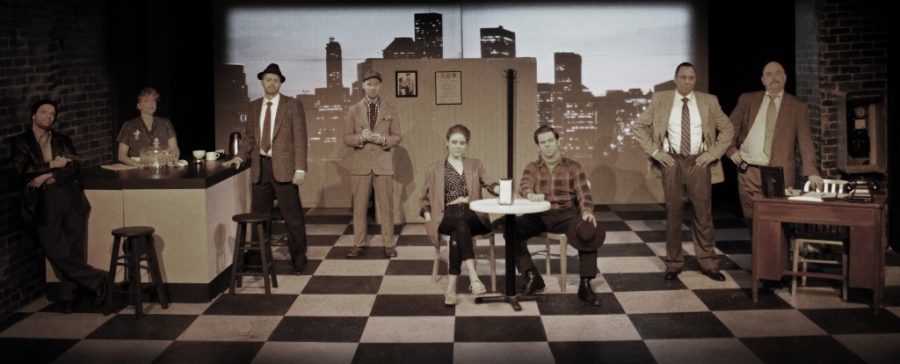

"The Ballad of Rodrigo", written by Jason S. Grossman and directed by Amber Gallery, is a large cast production with film noir style, intrigue, lust, and passions, all wrapped up in a classic storyline of underworld bad guys who have heart, and coppers who are not always the good guys. Think of the old 1930s and '40s gangster movies with James Cagney, Edward G. Robinson and Humphrey Bogart. Think of the slang of those days gone by, and think of a time when the ports of NYC were teeming with immigrants all trying to find their way and make something of their lives at any cost.
Unlike the movies of yesteryear which took place concurrent with the styles of the 1930s, neo-noir productions run the risk of not quite knowing which audience and time period they are playing to. This is the case with "The Ballad of Rodrigo", which walks and talks the '30s era, but at the same time speaks of being in the 21st century, has a storyline that needlessly relies on the existence of cell phones, and even makes references to “landline” phones. I understand the author's desire to frame the time as current, and such juxtapositions can be done successfully. But it was done to no real benefit here.
In “Rodrigo” we get to see some very entertaining performances from a large cast of 9 performers who are all talented, have a good understanding of their roles, and are well chosen for their parts. This is particularly true of the leading actress Alison Parks (Trina) and Mathew J. Nichols (Rodrigo), both of whom feel like they stepped right out of a Cagney film. Notable performances are also put forth by Cindy Keiter, who plays Sally, the proprietor of the requisite greasy spoon, and Gregory James Cohan, who plays the lead character Freddie Tower, the G-man.
Film noir was a powerful period style and time in film making. So the idea of taking film noir off the silver screen and putting it onto the live stage, is certainly a good one. But moving styles from one artistic medium to another isn't always easy. This is particularly true if the re-creators don't understand that what really made film noir a success wasn't really the great style, but rather the ridiculously compelling story lines of “The Maltese Falcon”, “The Naked City”, and “Double Indemnity”.
Unfortunately, the capable cast isn't able to sustain a story with so many distractions that its core plot is largely lost on the viewer. Moreover, even when it is able to be followed, the story does not present the viewer with enough reward for the effort. The author never gives us much in the way of humor, mystery or characters that we can care about. Story surprises that could have impact are spilled early on without any payoff. And the end-of-story twists that do exist are presented without any foreshadowing, so just fall flat. The direction never reins the production in, and instead allows a dizzying series of mini-scenes, many of which do little to move the story forward.
There is a good story in there, somewhere. It's just that nobody bothered to polish it, like one might do with an old Maltese falcon statuette.
"The Ballad of Rodgrio" plays through June 22nd at Tada Youth Theater